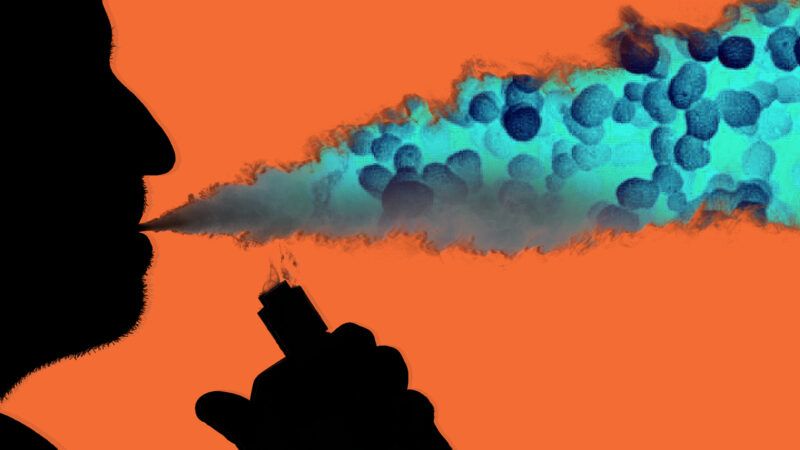Study Finds Vapers Not More Likely To Get COVID-19
The pervasive anti-vaping narrative at the beginning of the pandemic had real consequences.

Vapers are at no greater risk of being diagnosed with COVID-19, and smokers are significantly less likely to be infected. That's according to a new study published in the Journal of Primary Care & Community Health.
The study's authors are researchers at the Mayo Clinic who wanted to investigate whether electronic cigarette use might affect risk for testing positive for COVID-19. One of the difficulties in determining the relationship between vaping and COVID-19 has been a lack of data. There is a plethora of data on smoking status among those infected and hospitalized, but the same cannot be said for e-cigarettes.
To remedy this problem, from September 15, 2019, to November 30, 2020, the researchers screened 78,547 patients seeking medical care for e-cigarette and cigarette use during ambulatory appointments at their medical facility. After removing patients below the age of 12 and those who didn't want to be a part of the research, 69,264 patients were analyzed.
Patients who used only e-cigarettes were no more likely to have a COVID-19 diagnosis than those who don't smoke or vape. Those who smoked only cigarettes, on the other hand, were 57 percent less likely to be diagnosed with COVID-19. The results may come as a surprise to many as it was widely thought at the beginning of the pandemic that both smoking and vaping would cause more COVID-19 infections with worse symptoms.
But as the Mayo Clinic researchers make clear in their study, "the impact of tobacco use on SARS-CoV-2 infection risk and COVID-19 severity remains unclear."
There's been little research on whether vaping increases one's risk of testing positive for COVID-19. The most widely reported study was published last year in the Journal of Adolescent Health, which claimed young people who vaped were significantly more likely to be infected with COVID-19 than those who didn't. The study was severely criticized for faulty methodology and communication of results, including by Reason Foundation Policy Analyst Jacob James Rich who co-authored one of several letters to the journal highlighting the study's flaws. The study was used as justification by Rep. Raja Krishnamoorthi (D–Ill.) to demand a federal ban on all e-cigarettes during the course of the pandemic.
E-cigarettes were an early villain of the pandemic, despite no evidence of how they were affecting infections or hospitalizations. In February 2020, the New York State Academy of Family Physicians urged Gov. Andrew Cuomo to ban the sale of flavored e-cigarettes. The justification for the prohibition was an early study that found smokers were at increased risk of a severe outcome after being infected with COVID-19. Considering e-cigarettes are not combustible cigarettes and have been proven to be significantly safer and effective at helping smokers quit, it's hard to discern why the initial data on smoking from China would justify banning flavored vaping in New York. Nevertheless, flavored e-cigarettes were banned in New York in May 2020.
Appearing on NBC's Today Show on March 23, then-Surgeon General Jerome Adams postulated, without evidence, that vaping could be the reason young people may be at higher risk from COVID-19 than previously thought. "There are theories that it could be because we know we have a higher proportion of people in the United States and also in Italy who vape," said Adams.
Nora Volkow, director of the National Institute on Drug Abuse (NIDA) wrote in the Annals of Internal Medicine that vapers could be at high risk for COVID-19. Massachusetts Attorney General Maura Healey went so far as to issue an advisory warning that vaping could worsen the spread of COVID-19. In March 2020, New York City Mayor Bill de Blasio claimed, "If you are a smoker or a vaper that does make you more vulnerable." These claims essentially went unchallenged, aside from a handful of scientists and tobacco harm reduction advocates who raised the alarm.
The finding that smokers are less likely to be infected with COVID-19 is not a novel one. The vast majority of studies across the world show a similar result. These results hold in the majority of studies that adjust for factors such as age and gender.
The lack of clear and accurate communication about the relationship between smoking, vaping, and COVID-19 from public health authorities such as the World Health Organization, Centers for Disease Control and Prevention, and the Food and Drug Administration has had real-world consequences. Smokers were prioritized for vaccination despite there being no clear evidence they were at increased risk compared to the elderly or the obese.
Erroneously linking vaping to COVID-19 may have also increased skepticism among smokers about the benefits of switching to safer nicotine alternatives like e-cigarettes. Thanks to bad data and unsupported assumptions, members of Congress demanded the full-scale prohibition of a product that has helped millions of Americans quit smoking.
Smoking is widely known to be bad for your health, and everyone agrees youth should not be vaping. These messages don't need to be augmented with noble lies about COVID-19 to achieve a beneficial public health outcome.


Show Comments (31)